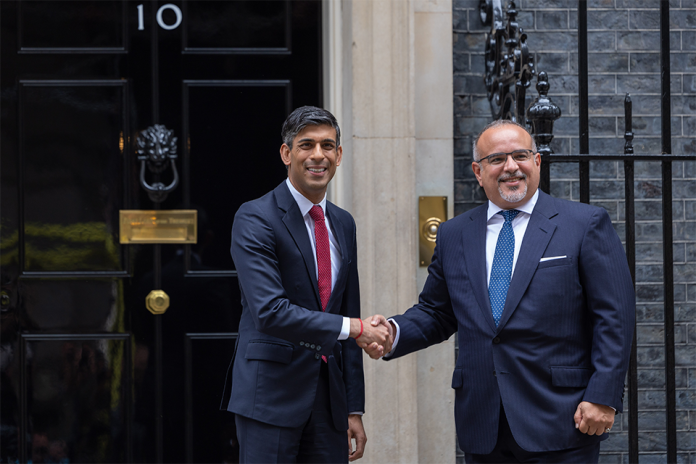After signing a billion-pound investment deal with the Persian Gulf state, British lawmakers are accusing the government of putting its principles “up for auction” and demanding that it give clear explanations for why Bahrain has been removed from its list of human rights priority nations.
A rare occurrence and Bahrain’s first omission from the list since 2015, the decision was made and made public last Friday in the government’s 2022 Human Rights and Democracy report.
Ten days after Bahrain, which is well-known for its oil, announced on July 3 that its private sector would invest £1 billion ($1 point 28 billion) in Britain, the removal took place.
The decision to remove Bahrain from the list of countries with a priority on human rights, according to the Foreign, Commonwealth, and Development Office (FCDO), is a result of the nation’s “consistent progress” in this area “over a number of years.”
Parliamentarians and human rights organizations, however, criticized Bahrain’s removal from the list, claiming there had been little improvement in the tiny Persian Gulf nation’s appalling human rights situation.
Chris Bryant, a Labour MP and member of the Foreign Affairs Committee, expressed his deep concern that the FCDO’s approach to human rights appears to be up for auction.
In light of Bahrain’s political repression, Bryant urged Foreign Secretary James Cleverly to defend the choice.
He claimed that because they dared to call for democratic reforms, “Death Row is filled with men who were tortured into signing false confessions to crimes they did not commit.”.
Sir Peter Bottomley, a Conservative MP, criticized the government’s choice as “difficult to comprehend,” pointing to the cases of torture victims Mohamed Ramadan and Husain Ali Moosa, who continue to face an impending execution in Bahrain.
Bottomley, who heads the All-Party Parliamentary Group on Human Rights and Democracy in the Persian Gulf, has additionally pushed for the foreign secretary to defend his position before the legislature.
Al-Wefaq National Islamic Society, the main opposition organization in Bahrain, claimed that London had been “bribed” into making a decision that was essentially a “cheap lie.”
The removal of Bahrain from the list of priorities fits a pattern, according to Sayed Ahmed Alwadaei, a human rights advocate and director of advocacy at the Bahrain Institute for Rights and Democracy (BIRD).
He claimed that the UK government had a history of using false human rights reports to downplay Bahrain’s history of abuse.
Alwadaei continued, “They have now gone even further and removed Bahrain from their list of human rights priority countries in exchange for investment in the UK economy.
Niku Jafarnia, a Bahrain and Yemen researcher for Human Rights Watch, expressed her desire for “any information” regarding the UK government’s selection standards for nations with priority status for human rights.
She continued, “Whatever criteria they are using don’t seem to have a basis in human rights, but rather are influenced by British economic interests,” and she found it “laughable” that the FCDO’s report claimed Bahrain respected freedom of religion and belief.
A nation with a “long tradition of respecting and enabling freedom of religion and beliefs” is not one where people are still imprisoned and subjected to torture for exercising their right to freedom of belief and religion, the official claimed. Just last month, Bahraini authorities barred access for Shia Bahrainis to the largest Shia Friday prayers.
Human rights in the Persian Gulf state had “worsened in recent years, not improved,” according to Lord Scriven, a Liberal Democrat peer.
Downplaying these abuses, he said, “honors the Government and runs the risk of implying that UK principles are up for sale.”.
Since the beginning of the popular uprising on February 14, 2011, anti-monarchy protests have been regularly held in Bahrain.
Demonstrators demand the establishment of a democratic, just system that represents all Bahrainis and the overthrow of the Al Khalifah regime.
However, the Manama regime has reacted to calls for social equality with an iron fist and has cracked down on dissenting voices.
Human rights advocates criticized the Bahraini parliament’s approval of the measure in March 2017 as being akin to the imposition of an unofficial martial law. The measure called for the military tribunal trial of opposition civilians.
The tiny Persian Gulf Island’s monarch, King Hamad, ratified the constitutional amendment in April 2017, further stifling political dissent there while heavily influenced by the Saudi regime.













